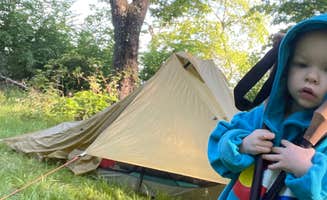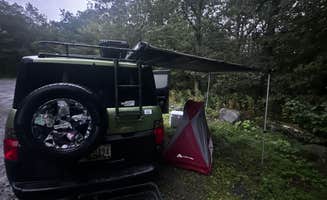Dispersed camping options near Lincoln Park, New Jersey remain limited, with most primitive sites concentrated along the Appalachian Trail corridor and neighboring state forests. Lincoln Park sits at approximately 200 feet above sea level in Morris County, with surrounding camping areas reaching elevations between 400-1,500 feet. The region experiences distinct seasonal changes with summer temperatures averaging 75-85°F and winter temperatures often dropping below freezing.
What to do
Hiking exploration: The Thunder Swamp Trailhead serves as a starting point for extensive trail networks in the Delaware State Forest, approximately 30 miles from Lincoln Park. As camper Jason R. notes, "Trailhead parking was chill for a night. No trouble. Tons of hiking. Went down Saw Creek trail to a marsh." This location requires permits for overnight stays.
Lakeside camping: Hickok Brook in New York state offers limited tent sites adjacent to water, approximately 45 miles from Lincoln Park. The area features three designated spots with no vehicle access beyond certain points. Camper Gregg T. advises, "It's a hike back to town... there is a small town 10 minutes away. Eldred, NY. Really is a nice quiet place."
Hammock camping: For those preferring hammocks to tents, several sites along the Appalachian Trail provide suitable tree coverage. At Appalachian Trail- Designated Backpacker Campsite 2, Katharine T. reports, "We camped nearer to others but there are secluded spots too. We'll maintained w bear boxes provided. Good trees for hammocking."
What campers like
Bear protection infrastructure: The designated backpacker sites along the Appalachian Trail provide bear boxes for food storage, reducing wildlife concerns. Katharine T. mentions the site is "well maintained w bear boxes provided," an important feature in an area with active black bear populations.
Balance of community and privacy: The Appalachian Trail camping areas offer a mix of social and secluded spots. According to Katharine T., the Designated Backpacker Campsite 2 provides the "perfect balance of community and space" where campers can choose more communal or private spots within the same general area.
Overnight parking access: Thunder Swamp Trailhead provides a convenient overnight option for hikers or those passing through. Benjamin H. describes it as "a gravel parking lot. Plenty of shade. No one bothered me," making it suitable for quick stays during trail explorations.
What you should know
Water availability limitations: Free camping near Lincoln Park, New Jersey typically lacks water sources. At the Appalachian Trail campsite, Katharine T. advises that there's "No Water (nearest is sunfish pound- easy hike about a 1 round trip)," requiring campers to carry sufficient water or plan for collection trips.
Vehicle clearance requirements: Access roads to remote camping spots often present challenges. At Hickok Brook, Corey warns, "The road is very rough with huge potholes so good clearance is a must. It's not a good spot for car camping but you could conceivably drive up to the spots and pull off the road to put up a small tent somewhere."
Permit requirements: Several dispersed camping options near Lincoln Park require permits. Gregg T. explains: "Where I originally camped was not a spot, according to Ranger. Had to move next to the lake. Need a permit on NY state land. Contact Rangers office of whatever county."
Tips for camping with families
Limited space considerations: Most primitive camping areas near Lincoln Park offer minimal space. At Floyd Bennett Field, sites accommodate small family groups but lack amenities, requiring complete self-sufficiency for water, waste management, and food storage.
Seasonal planning: Family camping trips benefit from strategic timing to avoid bugs and extreme weather. At Hickok Brook, Corey describes the sites as "Beautiful but buggy lakeside tent sites," suggesting spring or fall visits might provide more comfort for families with children.
Trail-based site selection: When camping with children along trails, choose sites with manageable hiking distances from trailheads. The Appalachian Trail sites require hiking access but vary in distance from road crossings, with some being more accessible for families with young children.
Tips from RVers
Size restrictions: No-cost camping near Lincoln Park presents significant challenges for RVs and larger vehicles. At Hickok Brook, Corey learned the hard way: "I drove in thinking that there would be flat places to park a very rugged camper in my full ton diesel pickup... It's not a good spot for car camping." Most dispersed sites in this region cannot accommodate RVs larger than small vans.
Seasonal road conditions: Road access to primitive camping areas deteriorates significantly after rain or snow. Winter and early spring often render many forest roads impassable for larger vehicles. Summer and fall typically provide better access conditions for reaching Thunder Swamp Trailhead and similar locations.
Limited overnight options: True boondocking or free camping for RVs near Lincoln Park is extremely limited. Most sites require either hiking access or provide only small parking areas unsuitable for larger vehicles. Campers seeking no-hookup RV options should investigate established campgrounds with primitive sites instead of dispersed locations.




